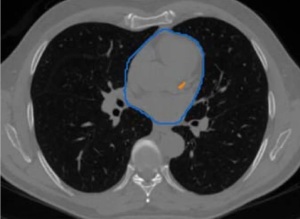Deep learning system could save time in scoring coronary calcium
por
John R. Fischer, Senior Reporter | February 08, 2021

The deep-learning system can automatically score coronary calcium and determine who is at high-risk of suffering a harmful cardiovascular event like a heart attack (photo courtesy of Nature Communications)
Quantifying and scoring coronary calcium may soon be possible to do in less time with a deep learning system developed by researchers at Brigham and Women’s Hospital and Massachusetts General Hospital.
While detectable on CT scans, coronary calcium requires radiological expertise, time and specialized equipment to calculate the amount of plaque present. Clinicians often must look at the CT slice by slice for 'bright specks' of calcium in the coronary arteries and circle each one. All the specks are then added up by the software they work with to calculate the coronary artery calcium score.
The new system is designed to automatically measure coronary artery calcium from CT scans, to help physicians and patients make more informed decisions about cardiovascular prevention. "In optimal settings, for cardiac CT scans, this process takes anywhere from one to eight minutes for an experienced reader, depending on the amount of calcium and the software. For non-cardiac chest CT scans -- for example to look for lung nodules -- the coronary artery calcium score is not quantified. Instead, the radiologist looks at the scan and makes a qualitative estimate of how much calcium is present. The problem with this approach is there can be substantial variability in how readers gauge the amount of calcium," Dr. Hugo Aerts, director of the Artificial Intelligence in Medicine (AIM) Program at Brigham and Women’s Hospital & Associate Professor at Harvard Medical School, told HCB News.
Aerts and his colleagues trained the system using information from more than 20,000 individuals. Data initially came from the Framingham Heart Study, in which asymptomatic participants from Framingham received calcium scoring CT scans that were manually scored by expert human readers. The system was then applied to three additional study cohorts, including the National Lung Screening Trial for heavy smokers undergoing lung cancer CT screenings; PROMISE for patients with stable chest pain who underwent cardiac CT; and ROMICAT-II, which provided cardiac CT to patients with acute chest pain.
Its automated calcium scores correlated closely with manual, human-made calcium scores and independently predicted who would have a major adverse cardiovascular event. In addition, the inclusion of three National Heart, Lung, and Blood Institute-funded trials in its training further supports the generalizability of these findings to clinical settings, according to the authors.
The study was overseen by Aerts; lead author Roman Zeleznik, a data scientist in the AIM Program; and Dr. Michael Lu, director of AI at the Massachusetts General Hospital Cardiovascular Imaging Research Center (CIRC). All three say it could help clinicians make more personalized decisions and hope in the long-term to implement the deep-learning system in EHRs.
"The most important next step is the prospective implementation and evaluation of the system in opportunistic and organized screening settings to identify unknown high risk individuals for cardiovascular disease (CVD), and include these individuals into CVD prevention programs. This can lead to an increase of population health," said Aerts.
The solution is currently only for research purposes but has been made open-source so that it is freely available to anyone.
The findings were published in Nature Communications.
|
|
|
You Must Be Logged In To Post A Comment
|
